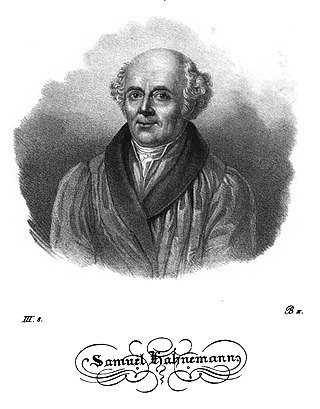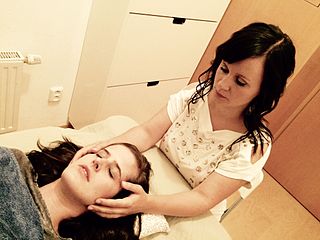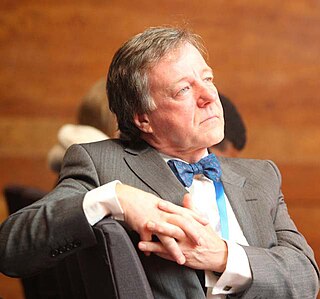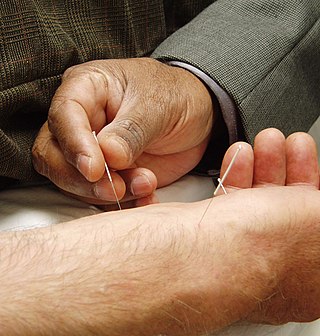Alternative medicine is any practice that aims to achieve the healing effects of medicine despite lacking biological plausibility, testability, repeatability or evidence of effectiveness. Unlike modern medicine, which employs the scientific method to test plausible therapies by way of responsible and ethical clinical trials, producing repeatable evidence of either effect or of no effect, alternative therapies reside outside of medical science and do not originate from using the scientific method, but instead rely on testimonials, anecdotes, religion, tradition, superstition, belief in supernatural "energies", pseudoscience, errors in reasoning, propaganda, fraud, or other unscientific sources. Frequently used terms for relevant practices are New Age medicine, pseudo-medicine, unorthodox medicine, holistic medicine, fringe medicine, and unconventional medicine, with little distinction from quackery.
The Alexander Technique, named after its developer Frederick Matthias Alexander (1869–1955), is a type of alternative therapy based on the idea that poor posture gives rise to a range of health problems. The American National Center for Complementary and Integrative Health classifies it as a "psychological and physical" complementary approach to health when used "together with" mainstream methods. When used "in place of" conventional medicine, it's considered "alternative".

Homeopathy or homoeopathy is a pseudoscientific system of alternative medicine. It was conceived in 1796 by the German physician Samuel Hahnemann. Its practitioners, called homeopaths, believe that a substance that causes symptoms of a disease in healthy people can cure similar symptoms in sick people; this doctrine is called similia similibus curentur, or "like cures like". Homeopathic preparations are termed remedies and are made using homeopathic dilution. In this process, the selected substance is repeatedly diluted until the final product is chemically indistinguishable from the diluent. Often not even a single molecule of the original substance can be expected to remain in the product. Between each dilution homeopaths may hit and/or shake the product, claiming this makes the diluent remember the original substance after its removal. Practitioners claim that such preparations, upon oral intake, can treat or cure disease.

Craniosacral therapy (CST) or cranial osteopathy is a form of alternative medicine that uses gentle touch to feel non-existent rhythmic movements of the skull's bones and supposedly adjust the immovable joints of the skull to achieve a therapeutic result. CST is a pseudoscience and its practice has been characterized as quackery. It is based on fundamental misconceptions about the anatomy and physiology of the human skull and is promoted as a cure-all for a variety of health conditions.

Quackwatch is a United States-based website, self-described as a "network of people" founded by Stephen Barrett, which aims to "combat health-related frauds, myths, fads, fallacies, and misconduct" and to focus on "quackery-related information that is difficult or impossible to get elsewhere". Since 1996 it has operated the alternative medicine watchdog website quackwatch.org, which advises the public on unproven or ineffective alternative medical remedies. The site contains articles and other information criticizing many forms of alternative medicine.

Nicholas David Ross is a British and German radio and television presenter. During the 1980s and 1990s he was one of the most ubiquitous of British broadcasters but is best known for hosting the BBC TV programme Crimewatch, which he left in 2007 after 23 years. He has subsequently filmed a series for BBC One called The Truth About Crime and has made documentaries for BBC Radio 4. He is chairman, president, trustee or patron of a number of charities including the National Fire Chiefs Council, and is President of the British Security Industries Association.
Anthroposophic medicine is a form of alternative medicine based on pseudoscientific and occult notions. Devised in the 1920s by Rudolf Steiner (1861–1925) in conjunction with Ita Wegman (1876–1943), anthroposophical medicine draws on Steiner's spiritual philosophy, which he called anthroposophy. Practitioners employ a variety of treatment techniques based upon anthroposophic precepts, including massage, exercise, counselling, and substances.

Edzard Ernst is a retired British-German academic physician and researcher specializing in the study of complementary and alternative medicine. He was Professor of Complementary Medicine at the University of Exeter, the world's first such academic position in complementary and alternative medicine.
Energy medicine is a branch of alternative medicine based on a pseudo-scientific belief that healers can channel "healing energy" into a patient and effect positive results. The field is defined by shared beliefs and practices relating to mysticism and esotericism in the wider alternative medicine sphere rather than any sort of unified terminology, leading to terms such as energy healing or vibrational medicine being used as synonymous or alternative names. In most cases there is no empirically measurable energy involved: the term refers instead to so-called subtle energy. Practitioners may classify the practice as hands-on, hands-off, and distant where the patient and healer are in different locations. Many schools of energy healing exist using many names: for example, biofield energy healing, spiritual healing, contact healing, distant healing, therapeutic touch, Reiki or Qigong.
Michael Baum, Professor Emeritus of Surgery and visiting Professor of Medical Humanities in University College London (UCL), is a British surgical oncologist who specialises in breast cancer treatment. He is also known for his contributions to the evaluation and support of patient quality of life. He has been Professor of Surgery in King's College London, the Royal Marsden Hospital and UCL. He is a notable critic of alternative medicine.
The Foundation for Integrated Health (FIH) was a charity run by King Charles III founded in 1993. The foundation promoted complementary and alternative medicine, preferring to use the term "integrated health", and lobbied for its inclusion in the National Health Service. The charity closed in 2010 after allegations of fraud and money laundering led to the arrest of a former official.
The Complementary and Natural Healthcare Council (CNHC) is a regulatory body in the United Kingdom which provides a voluntary register of complementary, rather than alternative medicine, therapists. The key purpose of CNHC is to act in the public interest and enable proper public accountability of the complementary therapists that it registers.
Karol Sikora is a British physician specialising in oncology, who has been described as a leading world authority on cancer. He was a founder and medical director of Rutherford Health, a company that provided proton therapy services, and is Director of Medical Oncology at the Bahamas Cancer Centre.

Trick or Treatment? Alternative Medicine on Trial is a 2008 book by Simon Singh and Edzard Ernst. The book evaluates the scientific evidence for alternative medicines such as acupuncture, homeopathy, herbal medicine, and chiropractic, and briefly covers 36 other treatments. It finds that the scientific evidence for these alternative treatments is generally lacking. The authors concluded that homeopathy is merely a placebo.

Michael Dixon LVO, OBE, FRCGP, FRCP is an English general practitioner and healthcare leader. He is Chair of The College of Medicine, Co-Chair of the National Social Prescribing Network, Visiting Professor at University College London and Westminster University and Head of the Royal Medical Household.

The German acupuncture trials were a series of nationwide acupuncture trials set up in 2001 and published in 2006 on behalf of several German statutory health insurance companies because of a dispute as to the usefulness of acupuncture. They consisted of one observational study on acupuncture side effects, and four randomized controlled trials (RCTs) investigating acupuncture treatment for low back pain, knee osteoarthritis, migraine prophylaxis, and tension-type headache. The trials are considered to be one of the largest clinical studies in the field of acupuncture.

Harmony: A New Way of Looking at Our World is a 2010 book written by Charles, Prince of Wales, with Tony Juniper and Ian Skelly. The book focuses on the world's environment which includes climate change, architecture and agriculture. The book has been translated into many different languages. There is also a children's edition of Harmony.

The Friends of Science In Medicine (FSM) is an Australian association which supports evidence-based medicine and strongly opposes the promotion and practice of unsubstantiated therapies that lack a scientifically plausible rationale. They accomplish this by publicly raising their concerns either through direct correspondence or through media outlets. FSM was established in December 2011 by Loretta Marron, John Dwyer, Alastair MacLennan, Rob Morrison and Marcello Costa, a group of Australian biomedical scientists and clinical academics.
Alternative medicine describes any practice which aims to achieve the healing effects of medicine, but which lacks biological plausibility and is untested or untestable. Complementary medicine (CM), complementary and alternative medicine (CAM), integrated medicine or integrative medicine (IM), and holistic medicine are among many rebrandings of the same phenomenon.
The infinitesimally low concentration of homeopathic preparations, which often lack even a single molecule of the diluted substance, has been the basis of questions about the effects of the preparations since the 19th century. Modern advocates of homeopathy have proposed a concept of "water memory", according to which water "remembers" the substances mixed in it, and transmits the effect of those substances when consumed. This concept is inconsistent with the current understanding of matter, and water memory has never been demonstrated to exist, in terms of any detectable effect, biological or otherwise.










